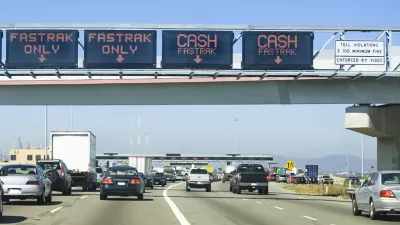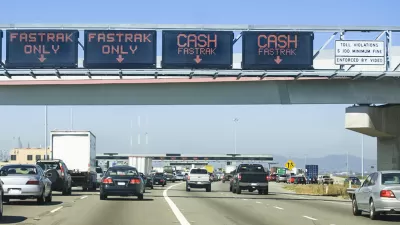The Washington Post editorializes against the use of general funds to fill the Highway Trust Fund shortfall ($18 billion annually), whether they be dedicated funds or offsets, and evaluates proposals from President Barack Obama and House Republicans.

In contrast to a recent op-ed that advocated using dedicated general funds revenue to fund transportation (posted here) and one senator's proposal to insist that use of general funds be offsetted, this editorial strongly makes the case for relying on user fees as has been the case since 1956.
"It is both efficient and fair to require drivers to pay according to the amount they exploit and degrade the roads," writes The Washington Post Editorial Board. "This discourages overuse rather than subsidizing big-time road users," they add.
The smart and obvious way to fund federal transportation policy is to create a steady, long-term funding source to finance multi-year projects, one that relies on fees from users — such as a higher gas tax or a vehicle-miles tax.
"The latest news is that House Republican leaders are drawing up a measly one-year trust fund fix [also posted here: "Buy a Stamp—Patch a Highway?"], which would conveniently push tough revenue choices past this year’s election," they write. However, Politico's Adam Snider indicates that's a no-go in the Senate - from at least one powerful Republican.
"I know they're trying to come up with a way to do this on a short-term basis. Ultimately we've got to get to a longer-term solution," Senate Commerce ranking member John Thune (R-S.D.) told MT.
The editorial is more direct, stating that House Republicans would take 10 years of savings (by ending Saturday delivery) "to pay for that one year of proposed highway spending," showing just how great a strain transportation is on the federal budget compared to other services.
President Obama's funding proposal, the Grow America Act, actually meets Sen. John Thune's criteria by providing four years of funding with a "one-time windfall from corporate tax reform," though it would not make for "smart transportation policy."
In fact, the editorial supports the funding mechanism of both proposals, i.e. ending Saturday postal service and corporate tax reform, but it opposes using them "to jury-rig the highway budget with unrelated 'offsets'". The editorial concludes with this warning:
If the nation’s leaders are too cowardly to make obvious policy choices this year, they will have to develop some backbone before the next self-imposed transportation funding crisis. At the rate we’re going, that won’t be so long from now.
FULL STORY: Congress detours from common sense on the Highway Trust Fund

Alabama: Trump Terminates Settlements for Black Communities Harmed By Raw Sewage
Trump deemed the landmark civil rights agreement “illegal DEI and environmental justice policy.”

Study: Maui’s Plan to Convert Vacation Rentals to Long-Term Housing Could Cause Nearly $1 Billion Economic Loss
The plan would reduce visitor accommodation by 25% resulting in 1,900 jobs lost.

Planetizen Federal Action Tracker
A weekly monitor of how Trump’s orders and actions are impacting planners and planning in America.

Wind Energy on the Rise Despite Federal Policy Reversal
The Trump administration is revoking federal support for renewable energy, but demand for new projects continues unabated.

Passengers Flock to Caltrain After Electrification
The new electric trains are running faster and more reliably, leading to strong ridership growth on the Bay Area rail system.

Texas Churches Rally Behind ‘Yes in God’s Back Yard’ Legislation
Religious leaders want the state to reduce zoning regulations to streamline leasing church-owned land to housing developers.
Urban Design for Planners 1: Software Tools
This six-course series explores essential urban design concepts using open source software and equips planners with the tools they need to participate fully in the urban design process.
Planning for Universal Design
Learn the tools for implementing Universal Design in planning regulations.
Caltrans
Smith Gee Studio
Institute for Housing and Urban Development Studies (IHS)
City of Grandview
Harvard GSD Executive Education
Toledo-Lucas County Plan Commissions
Salt Lake City
NYU Wagner Graduate School of Public Service



























